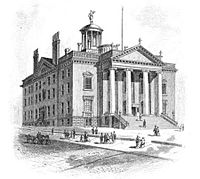49th New York State Legislature
| 49th New York State Legislature | |||||
|---|---|---|---|---|---|
|
|||||

The Old State Capitol (1879)
|
|||||
| Overview | |||||
| Jurisdiction | New York, United States | ||||
| Term | January 1 – December 31, 1826 | ||||
| Senate | |||||
| Members | 32 | ||||
| President | Lt. Gov. James Tallmadge, Jr. | ||||
| Assembly | |||||
| Members | 128 | ||||
| Speaker | Samuel Young (Buckt.) | ||||
| Party control | Bucktail (66-55) | ||||
| Sessions | |||||
|
|||||
| 1st | January 3 – April 18, 1826 |
|---|
The 49th New York State Legislature, consisting of the New York State Senate and the New York State Assembly, met from January 3 to April 18, 1826, during the second year of DeWitt Clinton's second tenure as Governor of New York, in Albany.
Under the provisions of the New York Constitution of 1821, 32 Senators were elected on general tickets in eight senatorial districts for four-year terms. They were divided into four classes, and every year eight Senate seats came up for election. Assemblymen were elected countywide on general tickets to a one-year term, the whole Assembly being renewed annually.
In 1824, Orleans County was split from Genesee County, and was apportioned 1 seat in the Assembly, taken from Genesee.
After the controversy about the presidential succession had come to an end with the election of John Quincy Adams, the factions of the Democratic-Republican Party re-aligned into "Bucktails" (led by U.S. Senator Martin Van Buren) and "Clintonians" (supporters of Gov. DeWitt Clinton).
The State election was held from November 7 to 9, 1825. Peter R. Livingston (2nd D.), John L. Viele (4th D.), Charles Stebbins (5th D.), Peter Hager 2d (6th D.), Truman Hart (7th D.), Ethan B. Allen (8th D.); and Assemblymen Joshua Smith (1st D.) and Ambrose L. Jordan (3rd D.) were elected to the Senate. Smith, Livingston, Stebbins and Hager were Bucktails, the other four were Clintonians.
The Legislature met for the regular session at the Old State Capitol in Albany on January 3, 1826, and adjourned on April 18.
...
Wikipedia
